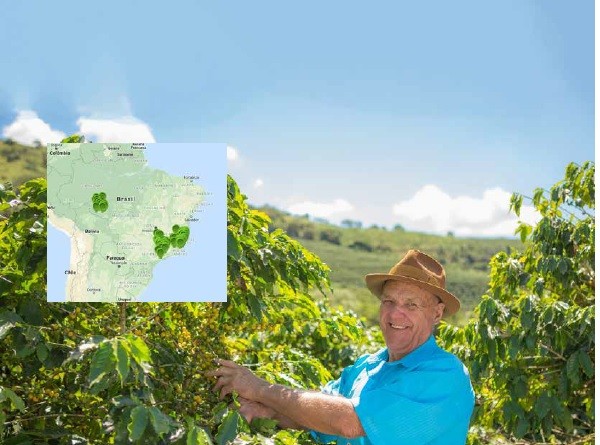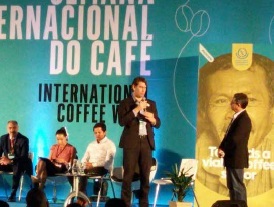
Cecafé’s sustainability area places great emphasis on social and environmental responsibility. Following its 2018 Strategic Plans, the area consolidated several positive actions for the whole Brazilian coffee business.
Cecafé took active part in several events, discussions, meetings and work groups on sustainability, climate change, water and soil preservation, good farming practices, food safety, and labor, environmental and regulatory issues to keep the institution active and up-to-date in the main global themes. Its programs and projects remain active and received special attention for their improvements and updates, while new initiatives were consolidated. Below are some of the year’s highlights:
To consolidate Cecafé’s reputation even further, the Social and Environmental Sustainability area attended several events related to the Rondonia Coffee Geographic Identification Project
(IG), promoted by the Brazilian Industrial Development Agency together with the Brazilian Coffee Industry Association (Abic) and the Brazilian Instant Coffee Industry Association (Abics). The objective of the project is two-fold – to support actions to improve the quality of Conilon coffee in the region and to establish its own identity thanks to local farming peculiarities and cultural and geographic aspects.
In September, the city of Cacoal (Rondonia) hosted the launching of the Informed Grower Program in the Indigenous coffee producers village of Saruí-Paiter.
Cecafé’s Safe Coffee Program (Café Seguro) started in 2011, focused on raising awareness and teaching coffee growers about the correct use of agrochemicals, thereby ensuring contaminant-free coffee. By means of actions held in On-Field Days, “Café Seguro” continued to contribute for the promotion of Good Farming Practices among producers.
The Informed Producer Program (Produtor Informado), created by Cecafé in 2006 to take digital inclusion to rural areas, carried on with its successful partnership with the Global Coffee Platform in 2018. In the year, 56 groups completed the program, which took digital inclusion and knowledge on good farming practices to more than 760 students. In addition to classes, several on-field days were promoted to show, in practice, efforts to have an increasingly sustainable coffee production, with higher productivity and expanded application of research, technology and field improvements.
The program’s website, created by Cecafé, releases data and results accomplished, in addition to bringing details on the partner institutions, working as an organization system for instructors and administrators. With online information, Cecafé gained efficiency in controls and detailed analyses on the Program, always seeking continuous improvement and efficiency.
Since the Program started, more than 5 thousand producers were trained, in that more than 3,400 are enrolled in the control system created in 2016.
Informed Producer Program:
- 13 institutions participating in 2017
- 23 institutions participating in 2018
- More than 5 thousand producers trained since the Program started;
- 3,410 small and medium-sized producers participated in the program from 2016 to 2018 (GCP partnership) 56 groups attended, with 713 producers in 2018.

In 2018, there was a 76% increase in the number of partner institutions, including Basf, Econ, JDE, Keurig, Nestle, Olam and Syngenta, thus adding robustness to the new project entitled Proper Use of Agrochemicals, in which Cecafé’s Informed Producer in one of the pillars.
Another successful project was the members’ initiative geared to grass management in Espírito Santo coffee growing, by means of a partnership between Cecafé, Nestlé, CETCAF (Coffee Technology Development Center) and Incaper (Espírito Santo Institute of Research, Technical Assistance and Rural Extension) and the Global Coffee Platform. Through the Informed Producer Program, on-field days and workshops on sustainability brought the necessary knowledge to coffee growers to accomplish suitable chemical biomass control in coffee areas, including the importance of maintaining the biomass, suitable control times, mixture preparation and agrochemicals application technology.
Successful partnerships with the Global Coffee Platform, EMATER/MG, INCAPER, EMATER/RO, IFES, Hanns Neumann Foundation, Cooxupé, Via Verde, Exportadora Guaxupé, Cocapec, and Cooabriel continue to make the program a reference and enable it to reach the results expected in the four top producer states (MG, ES, SP and RO), and to be present in more than 100 municipalities. In 2019, new on-field actions and innovations are expected.


Cecafé was present in the International Coffee Week with a multi-stakeholder stand to promote Sustainability and Social Responsibility actions. Partners in this initiative included Hanns Neumann Foundation and InPACTO Institute together with the American NGO CSR and the Global Coffee Platform. The company Três Corações also contributed with the initiative by providing a coffee machine and a barista to serve coffees produced by small growers from Minas Gerais, participating in Hans Neumann Foundation’s program –Stronger Coffee.
Worth noting in the Global Coffee Sustainability Conference were the participations of Cecafé Managing Director, Marcos Matos, in the panel “Creating global change through local action” and Lilian Vendrametto, Sustainability Manager, in the launch of the “Proper Use of Agrochemicals Project”, a partnership between Cecafé, PGC in Brazil and several agencies and companies. Parallel to the International Coffee Week, the event “Coffee & Social Agenda” took place. The event was organized by InPACTO and Cecafé was present in the panel “Brazilian Coffee Panel” with a lecture by Lilian Vendrametto on Sustainability in Brazilian Coffee Growing, showing the importance of Brazil’s consolidation as reference in the social sustainable chain, including human rights, transparency, traceability and promotion of decent labor.
Cecafé further strengthened its relations with InPACTO Institute – Brazil’s leading institution fully focused on eradicating slave-like labor in the country, taking active part in the events Brazil Coffee Panel and Coffee Work Group. The project’s goal, fully aligned with international demands and expectations and the very need for transparency in the global arena, is to expand the involvement of all players in the promotion of a positive transforming agenda of decent labor in the coffee production chain. The project has the support of the American NGO Catholic Relief Services and Cecafé.
Another highlight is the Coffee Children in School Program, which started back in 2003 with the objective of setting up Digital Laboratories, with computer equipment and Internet access at schools with educational support provided by a teaching expert hired by Cecafé. In total, 137 Digital Laboratories were set up in 95 coffee growing municipalities, in addition to 1.37K computers (10 computers per classroom), 116 of which with Internet access, and investments updated at roughly R$ 9 million.
The establishment of Caconde Sustainable Complex is also worth noting since it consolidates several socioenvironmental initiatives geared at improving coffee growing and trading conditions, such as: safety, labor, environment and land regulation. The institutions that backup/support this commendable project include, in addition to Cecafé: Abapruc (Caconde Rural Producer Districts Association), Exportadora Guaxupé, CATI Association, FAESP and SENAR SP.
Final Considerations
The year 2018 ended as a year of hard work of many accomplishments. The year 2019 promises to be a year full of challenges for Brazil, particularly for the agribusiness and export sectors. However, it is adverse times that create the greatest opportunities. There is high expectation for the creation of Cecafé’s Third Sector Organization—a not-for-profit agency with the objective of accessing tax benefits and fiscal incentives to further expand Cecafé’s successful socioenvironmental projects and continue to follow its mission: walking the right path for an increasingly sustainable and socially responsible future.
Marcos Matos – CECAFÉ CEO
Lilian Vendrametto – CECAFÉ Sustainability Manager


Leave A Comment